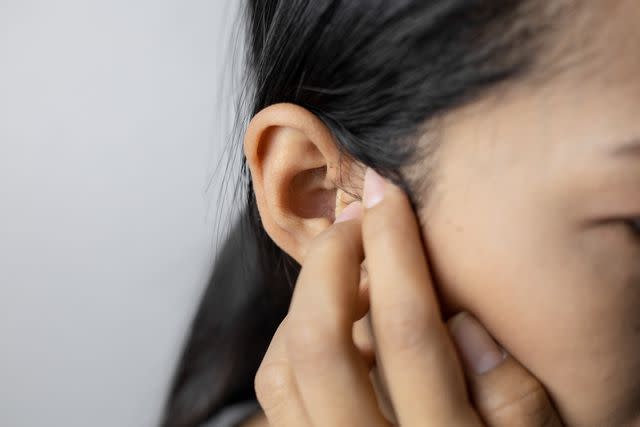Preauricular Lymph Nodes: What to Know
These lymph modes are located in front of your ears, and can become swollen if you have an infection in your head or neck.
Medically reviewed by John Carew, MD
Preauricular lymph nodes are lymphatic structures in front of your ears, on either side of your face. They’re part of the lymphatic system, which helps clear bacteria, viruses, and other infection causes from your body. Swollen lymph nodes, called lymphadenopathy or adenopathy, commonly occur when your body is fighting off an infection. Although swollen lymph nodes behind the ear are more common due to the location of lymph nodes in the neck, some people will experience swollen preauricular lymph nodes, which can lead to swelling and tenderness in front of the ears when they have ear infections, tooth infections, or other illnesses.
Continue reading to learn more about preauricular lymph nodes, including what can cause them to swell, how to treat swollen lymph nodes, and when to see a healthcare provider.

P Stock / Getty Images
What Are Preauricular Lymph Nodes?
The preauricular lymph nodes are located just in front of your ears, on top of your jaw bones. "Auricular" means "having to do with the ear" and "pre" means "in front." They’re part of the cervical lymph nodes, the region of lymph nodes found around your neck.
Lymph nodes, including the preauricular lymph nodes, are important to the body. Lymph nodes filter lymph waste, which clears dangerous cells like cancer, bacteria, and viruses from tissues throughout the body. The lymph nodes remove these dangerous cells to keep you healthy. This is a critical part of your immune system.
Swollen lymph nodes happen when your body is fighting an infection or, rarely, cancer or an autoimmune disease. That’s because the lymph nodes are working extra hard to rid your body of the infection.
Common Causes of Preauricular Lymph Node Swelling
You have lymph nodes all over your body. Some are more likely to have noticeable swelling, including the lymph nodes in the neck, groin, and underarms.
The preauricular lymph nodes don’t commonly swell, but when they do, it’s most often a sign of a local infection in your face or head. The infections that can cause swollen preauricular lymph nodes include:
Salivary gland infections, infections of the glands that secrete saliva.
Ear infections, particularly swimmer’s ear, or otitis externa, an infection of the outer ear canal.
Adenoviruses, which can cause cold- or flu-like symptoms, or conjunctivitis.
Parinaud oculoglandular syndrome, a condition that’s similar to pink eye and can be caused by cat scratch fever.
Non-tuberculous mycobacterial infection, or NTM, a bacterial infection most common in kids under five years old.
Other Causes
Like other types of swollen lymph nodes, enlarged preauricular lymph nodes can also be caused by:
Autoimmune disorders, including human immunodeficiency virus (HIV)
Blood and lymphatic cancers, including leukemia and lymphoma as well as skin cancers and ear cancer
Allergic reactions, including seasonal allergies
How Are Swollen Preauricular Lymph Nodes Treated?
In most cases, swollen pre auricular lymph nodes don’t need treatment. The soreness and tenderness usually resolves within a few days, and the nodes will return to their normal size within a few weeks. While living with the swelling can be annoying, remind yourself that it’s a sign that your immune system is doing exactly what it should be!
However, in some cases, the infection or ailment that causes swollen lymph nodes will need treatment. For example, if a tooth infection contributes to your swollen lymph nodes, you’ll need to see a dentist and perhaps start antibiotics. If a more serious underlying condition, like HIV or cancer, is causing your swollen lymph nodes, you’ll work with a specialist to create a treatment plan. As the underlying issue gets better, your lymph nodes will look less inflamed.
In the meantime, you can use a cold compress or over-the-counter anti-inflammatory medication like Tylenol or NSAIDs to manage your pain and discomfort.
When to Contact a Healthcare Provider
Usually, you don’t need to see a healthcare provider about swollen lymph nodes. However, you should see a healthcare provider if:
Your lymph nodes are red or very painful
They feel hard, or fixed in one space
They don’t return to their normal size within a few weeks
They continue to get larger
You have other symptoms like fever or unexplained weight loss
Swollen lymph nodes in children are considered anything larger than half an inch. If your child has a lymph node that’s swollen to more than that size, call their healthcare provider.
Summary
Preauricular lymph nodes are located in front of your ears. They can become swollen after infections including salivary gland infections, eye infections, tooth infections, or even the common cold. In these cases, the swelling often resolves on its own within a few weeks.
If your swollen lymph nodes last for more than a few weeks, reach out to your healthcare provider. In rarer cases, swollen lymph nodes can be a sign of a serious underlying illness, like cancer, HIV, or severe infection, that needs to be addressed. Likewise, call your healthcare provider if you experience any concerning symptoms, including a fever or unexplained weight loss.
Read the original article on Verywell Health.

